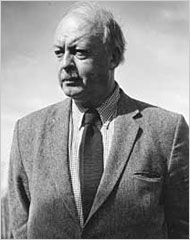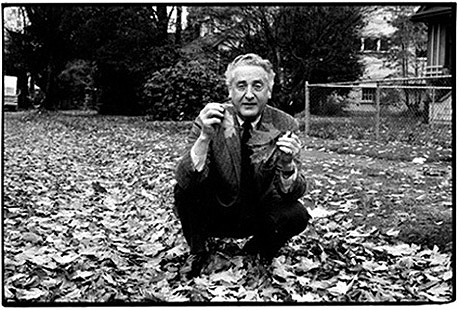<Back to Index>
- Poet, Publisher and Photographer Jonathan Williams, 1929
- Editor and Publisher Donald Merriam Allen, 1912
PAGE SPONSOR

Jonathan Williams (March 8, 1929 – March 16, 2008) was an American poet, publisher, essayist, and photographer. He is known as the founder of The Jargon Society, which has published poetry, experimental fiction, photography, and folk art for more than fifty years. He died March 16, 2008 in Highlands, NC, from pneumonia.
Based in Scaly Mountain, North Carolina, and for many years also in the Yorkshire Dales in England, both Williams and his publishing venture had long been associated with the Black Mountain Poets. Among the press's offerings are works by Charles Olson, Paul Metcalf, Lorine Niedecker, Lou Harrison, Mina Loy, Joel Oppenheimer, Ronald Johnson, James Broughton, Alfred Starr Hamilton and many other works by the American and British avant garde.
Once described as a "a busy gadfly who happened somehow to pitch on a slope in western North Carolina," Williams was a living link between the experimental poets of Modernism's "second wave" and the unknown vernacular artists of Appalachia. Guy Davenport likened Williams' use of "found language" to the use of "found footage" by avant garde filmmakers, as well as describing Williams as a species of cultural anthropologist. Williams for his part explained the fascination of such material in plainer terms:
“ Well, as you know, a lot of my poetry is found and that’s, I think, because I think I’m quite a good listener and I’m willing to lay back and listen, and I think it’s something do with living in the country. I mean, this place, Skywinding Farm, there are times when Tom Meyer and I will only see somebody from the outside world once or twice a week. And we’ve known each other so long that we don’t talk as much as we might. Tom can talk up a storm, He’s up there in the Duncan / Olson class. So I like to listen and I like to hear things, so if you listen carefully then you do find things. I do it all the time. I mean, you know the early book, Blues and Roots, which was done in the course of walking a big piece of the Appalachian Trail, I listened to mountain people for over a thousand miles and I really heard some amazing stuff. And I left it pretty much as I heard it. I didn’t have to do anything but organize a little bit, crystallize it, you know. That’s the thing I love about found material, you wake it up, you “make” it into something. ”
The literary critic Hugh Kenner described Williams as the "truffle hound of American poetry."
A longtime contributing editor of the photography journal Aperture, Williams lived in Scaly Mountain, North Carolina.

Donald Merriam Allen (b. Iowa, 1912 - d. San Francisco, August 29, 2004), influential editor, publisher and translator of contemporary American literature. He is perhaps best known for his project The New American Poetry 1945 - 1960 (1960), among the several important anthologies of contemporary American innovative writing he made available to the public. Allen began his career, in part, as a translator. He was one of the first translators of French - Romanian Absurdist playwright Eugène Ionesco, and his 1958 volume Four Plays of Eugène Ionesco helped to introduce the playwright to American audiences in the 1960s.
Allen's impact as an editor, publisher and friend to poets continued to be felt well into the 21st century. Along with editing work by Lew Welch, Allen edited Frank O'Hara, including the seminal Collected Poems (1971; 1991) and a Selected Poems (1974). He is referred to directly in O'Hara's "Personal Poem" which is in Lunch Poems, a book Allen also edited. He says, in reference to a conversation he had with LeRoi Jones, "we don't like Lionel Trilling / we decide, we like Don Allen." He served as the CEO of Grey Fox Press, publishing important work by Jack Spicer along with such volumes as Enough Said (1980) by Philip Whalen and I Remain (1980), a collection of Welch's letters.
While working with the Four Seasons Foundation, Allen assisted in the publication of (among others): Interviews (1980) by Edward Dorn, A Quick Graph: Collected Notes and Essays (1970) by Robert Creeley, and The Graces (1983) by Aaron Shurin. In 1997, he helped edit, along with Benjamin Friedlander, the Collected Prose of Charles Olson (University of California Press).